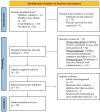Effects of music training in executive function performance in children: A systematic review
- PMID: 36003104
- PMCID: PMC9393548
- DOI: 10.3389/fpsyg.2022.968144
Effects of music training in executive function performance in children: A systematic review
Abstract
Music training has traditionally been a fundamental component of children's education across several cultures. Moreover, music training has been hypothesized to enhance the development of executive functions and improve executive performance in children. In this systematic review, we analyze the available evidence of the effects of music training on executive function performance, evaluated using validated neuropsychologic batteries and classic tasks. To achieve this objective, we performed a systematic search in three databases (PubMed, Ovid MEDLINE, and Scopus) and selected case-control or intervention studies conducted on children with neurotypical development. We analyzed 29 studies that met the inclusion criteria and observed significant heterogeneity among the music interventions and methods for assessing executive functions. The review of the available literature suggests a beneficial effect of music training in core executive function performance, primarily in inhibitory control, and to a lesser extent, in working memory and cognitive flexibility.
Keywords: children; cognitive flexibility; executive functions; inhibitory control; music training; working memory.
Copyright © 2022 Rodriguez-Gomez and Talero-Gutiérrez.
Conflict of interest statement
The authors declare that the research was conducted in the absence of any commercial or financial relationships that could be construed as a potential conflict of interest.
Figures
Similar articles
-
Effects of music training on executive functions in preschool children aged 3-6 years: systematic review and meta-analysis.Front Psychol. 2025 Jan 15;15:1522962. doi: 10.3389/fpsyg.2024.1522962. eCollection 2024. Front Psychol. 2025. PMID: 39881691 Free PMC article.
-
Multimodal music training enhances executive functions in children: Results of a randomized controlled trial.Ann N Y Acad Sci. 2022 Oct;1516(1):95-105. doi: 10.1111/nyas.14857. Epub 2022 Jul 27. Ann N Y Acad Sci. 2022. PMID: 35899371 Clinical Trial.
-
Sustained Effect of Music Training on the Enhancement of Executive Function in Preschool Children.Front Psychol. 2019 Aug 22;10:1910. doi: 10.3389/fpsyg.2019.01910. eCollection 2019. Front Psychol. 2019. PMID: 31507486 Free PMC article.
-
Effects of Sport-Based Interventions on Children's Executive Function: A Systematic Review and Meta-Analysis.Brain Sci. 2021 Jun 7;11(6):755. doi: 10.3390/brainsci11060755. Brain Sci. 2021. PMID: 34200362 Free PMC article. Review.
-
The effects of musical instrument training on fluid intelligence and executive functions in healthy older adults: A systematic review and meta-analysis.Brain Cogn. 2024 Mar;175:106137. doi: 10.1016/j.bandc.2024.106137. Epub 2024 Feb 9. Brain Cogn. 2024. PMID: 38340535
Cited by
-
The Role of Music in Psychedelic-Assisted Therapy: A Comparative Analysis of Neuroscientific Research, Indigenous Entheogenic Ritual, and Contemporary Care Models.Psychedelic Med (New Rochelle). 2024 Dec 2;2(4):221-233. doi: 10.1089/psymed.2023.0058. eCollection 2024 Dec. Psychedelic Med (New Rochelle). 2024. PMID: 40051482
-
Self-directed music play to improve executive function in young children using NIRS.Sci Rep. 2025 Jul 22;15(1):26608. doi: 10.1038/s41598-025-10984-1. Sci Rep. 2025. PMID: 40695875 Free PMC article. Clinical Trial.
-
Chess classes and executive function skills in 5-6 years old children: evidence from cross-sectional study.Front Psychol. 2025 Jul 21;16:1564963. doi: 10.3389/fpsyg.2025.1564963. eCollection 2025. Front Psychol. 2025. PMID: 40761454 Free PMC article.
-
Regular rhythmic primes improve sentence repetition in children with developmental language disorder.NPJ Sci Learn. 2023 Jul 10;8(1):23. doi: 10.1038/s41539-023-00170-1. NPJ Sci Learn. 2023. PMID: 37429839 Free PMC article.
-
Brain-behavior correlates of rhythmic timing and auditory-motor synchronization in children with developmental coordination disorder: an EEG study.Front Hum Neurosci. 2025 Jun 5;19:1602580. doi: 10.3389/fnhum.2025.1602580. eCollection 2025. Front Hum Neurosci. 2025. PMID: 40538594 Free PMC article.
References
-
- Bayanova L., Chichinina E., Veraksa A., Almazova O., Dolgikh A. (2022). Difference in executive functions development level between two groups: preschool children who took extra music classes in art schools and children who took only general music and dance classes offered by preschools. Educ. Sci. 12, 119. 10.3390/educsci12020119 - DOI
Publication types
LinkOut - more resources
Full Text Sources
Miscellaneous


